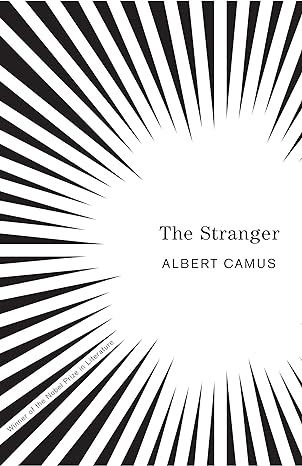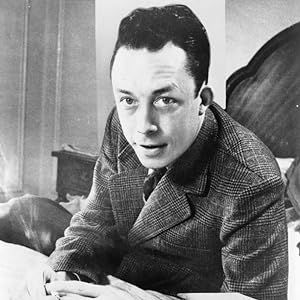The Stranger
4.5
-
10,975 ratings
With the intrigue of a psychological thriller, The Stranger—Camus's masterpiece—gives us the story of an ordinary man unwittingly drawn into a senseless murder on an Algerian beach. With an Introduction by Peter Dunwoodie; translated by Matthew Ward.
Behind the subterfuge, Camus explores what he termed "the nakedness of man faced with the absurd" and describes the condition of reckless alienation and spiritual exhaustion that characterized so much of twentieth-century life.
“The Stranger is a strikingly modern text and Matthew Ward’s translation will enable readers to appreciate why Camus’s stoical anti-hero and devious narrator remains one of the key expressions of a postwar Western malaise, and one of the cleverest exponents of a literature of ambiguity.” —from the Introduction by Peter Dunwoodie
First published in 1946; now in translation by Matthew Ward.
Kindle
$0.00
Available instantly
Paperback
$10.99
Ships from
Amazon.com
Payment
Secure transaction
ISBN-10
9780679720201
ISBN-13
978-0679720201
Print length
123 pages
Language
English
Publisher
Vintage
Publication date
March 12, 1989
Dimensions
5.14 x 0.39 x 7.95 inches
Item weight
4.8 ounces
Popular Highlights in this book
Since we’re all going to die, it’s obvious that when and how don’t matter.
Highlighted by 3,326 Kindle readers
When I was first imprisoned, the hardest thing was that my thoughts were still those of a free man.
Highlighted by 2,695 Kindle readers
On my way out I was even going to shake his hand, but just in time, I remembered that I had killed a man.
Highlighted by 2,337 Kindle readers
Product details
ASIN :
0679720200
File size :
239 KB
Text-to-speech :
Enabled
Screen reader :
Supported
Enhanced typesetting :
Enabled
X-Ray :
Not Enabled
Word wise :
Enabled
Editorial Reviews
The Stranger is not merely one of the most widely read novels of the 20th century, but one of the books likely to outlive it. Written in 1946, Camus's compelling and troubling tale of a disaffected, apparently amoral young man has earned a durable popularity (and remains a staple of U.S. high school literature courses) in part because it reveals so vividly the anxieties of its time. Alienation, the fear of anonymity, spiritual doubt--all could have been given a purely modern inflection in the hands of a lesser talent than Camus, who won the Nobel Prize in 1957 and was noted for his existentialist aesthetic. The remarkable trick of The Stranger, however, is that it's not mired in period philosophy.
The plot is simple. A young Algerian, Meursault, afflicted with a sort of aimless inertia, becomes embroiled in the petty intrigues of a local pimp and, somewhat inexplicably, ends up killing a man. Once he's imprisoned and eventually brought to trial, his crime, it becomes apparent, is not so much the arguably defensible murder he has committed as it is his deficient character. The trial's proceedings are absurd, a parsing of incidental trivialities--that Meursault, for instance, seemed unmoved by his own mother's death and then attended a comic movie the evening after her funeral are two ostensibly damning facts--so that the eventual sentence the jury issues is both ridiculous and inevitable.
Meursault remains a cipher nearly to the story's end--dispassionate, clinical, disengaged from his own emotions. "She wanted to know if I loved her," he says of his girlfriend. "I answered the same way I had the last time, that it didn't mean anything but that I probably didn't." There's a latent ominousness in such observations, a sense that devotion is nothing more than self-delusion. It's undoubtedly true that Meursault exhibits an extreme of resignation; however, his confrontation with "the gentle indifference of the world" remains as compelling as it was when Camus first recounted it. --Ben Guterson
Sample
PART ONE
I
Maman died today. Or yesterday maybe, I don't know. I got a telegram from the home: "Mother deceased. Funeral tomorrow. Faithfully yours." That doesn't mean anything. Maybe it was yesterday.
The old people's home is at Marengo, about eighty kilometers from Algiers, I'll take the two o'clock bus and get there in the afternoon. That way I can be there for the vigil and come back tomorrow night. I asked my boss for two days off and there was no way he was going to refuse me with an excuse like that. But he wasn't too happy about it. I even said, "It's not my fault." He didn't say anything. Then I thought I shouldn't have said that. After all, I didn't have to anything to apologize for. He's the one who should have offered his condolences. But he probably will day after tomorrow, when he sees I'm in mourning. For now, it's almost as if Maman weren't dead. After the funeral, though, the case will be closed, and everything will have a more official feel to it.
I caught the two o'clock bus. It was very hot. I ate at the restaurant, at Céleste's, as usual. Everybody felt very sorry for me, and Céleste said, "You only have one mother." When I left, they walked me to the door. I was a little distracted because I still had to go up to Emmanuel's place to borrow a black tie and an arm band. He lost his uncle a few months back.
I ran so as not to miss the bus. It was probably because of all the rushing around, and on top of that the bumpy ride, the smell of gasoline, and the glare of the sky and the road, that I dozed off. I slept almost the whole way. And when I woke up, I was slumped against a soldier who smiled at me and asked if I'd been traveling long. I said, "Yes," just so I wouldn't have to say anything else.
The home is two kilometers from the village. I walked them. I wanted to see Maman right away. But the caretaker told me I had to see the director first. He was busy, so I waited awhile. The caretaker talked the whole time and then I saw the director. I was shown into his office. He was a little old man with the ribbon of the Legion of Honor in his lapel. He looked at me with his clear eyes. Then he shook my hand and held it so long I didn't know how to get it loose. He thumbed through a file and said, "Madame Meursault came to us three years ago. You were her sole support." I thought he was criticizing me for something and I started to explain. But he cut me off. "You don't have to justify yourself, my dear boy. I've read your mother's file. You weren't able to provide for her properly. She needed someone to look after her. You earn only a modest salary. And the truth of the matter is, she was happier here." I said, "Yes, sir." He added, "You see, she had friends here, people her own age. She was able to share things from the old days with them. You're young, and it must have been hard for her with you."
It was true. When she was at home with me, Maman used to spend her time following me with her eyes, not saying a thing. For the first few days she was at the home she cried a lot. But that was because she wasn't used to it. A few months later and she would have cried if she'd been taken out. She was used to it. That's partly why I didn't go there much this past year. And also because it took up my Sunday--not to mention the trouble of getting to the bus, buying tickets, and spending two hours traveling.
The director spoke to me again. But I wasn't really listening anymore. Then he said, "I suppose you'd like to see your mother." I got up without saying anything and he led the way to the door. On the way downstairs, he explained, "We've moved her to our little mortuary. So as not upset the others. Whenever one of the residents dies, the others are a bit on edge for the next two or three days. And that makes it difficult to care for them." We crossed a courtyard where there were lots of old people chatting in little groups. As we went by, the talking would stop. And then the conversation would start up again behind us. The sound was like the muffled jabber of parakeets. The director stopped at the door of a small building. "I'll leave you now, Monsieur Meursault. If you need me for anything, I'll be in my office. As is usually the case, the funeral is set for ten o'clock in the morning. This way you'll be able to keep vigil over the departed. One last thing: it seems your mother often expressed to her friends her desire for a religious burial. I've taken the liberty of making the necessary arrangements. But I wanted to let you know." I thanked him. While not an atheist, Maman had never in her life given a thought to religion.
I went in. It was a very bright, whitewashed room with a skylight for a roof. The furniture consisted of some chairs and some cross-shaped sawhorses. Two of them, in the middle of the room, were supporting a closed casket. All you could see were some shiny screws, not screwed down all the way, standing out against the walnut-stained planks. Near the casket was an Arab nurse in a white smock, with a brightly colored scarf on her head.
Just then the caretaker came in behind me. He must have been running. He stuttered a little. "We put the cover on, but I'm supposed to unscrew the casket so you can see her." He was moving toward the casket when I stopped him. He said, "You don't want to?" I answered, "No." He was quiet, and I was embarrassed because I felt I shouldn't have said that. He looked at me and then asked, "Why not?" but without criticizing, as if he just wanted to know. I said, "I don't know." He started twirling his moustache, and then without looking at me, again he said, "I understand." He had nice pale blue eyes and a reddish complexion. He offered me a chair and then sat down right behind me. The nurse stood up and went toward the door. At that point the caretaker said to me, "She's got an abscess." I didn't understand, so I looked over at the nurse and saw that she had a bandage wrapped around her head just below the eyes. Where her nose should have been, the bandage was flat. All you could see of her face was the whiteness of the bandage.
When she'd gone, the caretaker said, "I'll leave you alone." I don't know what kind of gesture I made, but he stayed where he was, behind me. Having this presence breathing down my neck was starting to annoy me. The room was filled with beautiful late-afternoon sunlight. Two hornets were buzzing against the glass roof. I could feel myself getting sleepy. Without turning around, I said to the caretaker, "Have you been here long?" Right away he answered, "Five years"--as if he'd been waiting all along for me to ask.
After that he did a lot of talking. He would have been very surprised if anyone had told him he would end up caretaker at the Marengo home. He was sixty-four and came from Paris. At that point I interrupted him, "Oh, you're not from around here?" Then I remembered that before taking me to the director's office, he had talked to me about Maman. He'd told me that they had to bury her quickly, because it gets hot in the plains, especially in this part of the country. That was when he told me he had lived in Paris and that he had found it hard to forget it. In Paris they keep vigil over the body for three, sometimes four days. But here you barely have time to get used to the idea before you have to start running after the hearse. Then his wife had said to him, "Hush now, that's not the sort of thing to be telling the gentleman." The old man had blushed and apologized. I'd stepped in and said, "No, not at all." I thought what he'd been saying was interesting and made sense.
Read more
About the authors
Albert Camus
Albert Camus was a French philosopher, author, and journalist. His views contributed to the rise of the philosophy known as absurdism. He wrote in his essay The Rebel that his whole life was devoted to opposing the philosophy of nihilism while still delving deeply into individual freedom. He won the Nobel Prize in Literature in 1957.
Camus did not consider himself to be an existentialist despite usually being classified as one, even in his lifetime. In a 1945 interview, Camus rejected any ideological associations: ""No, I am not an existentialist. Sartre and I are always surprised to see our names linked..."".
Camus was born in Algeria to a Pied-Noir family, and studied at the University of Algiers from which he graduated in 1936. In 1949, Camus founded the Group for International Liaisons to ""denounce two ideologies found in both the USSR and the USA"".
Read more
Reviews
Customer reviews
4.5 out of 5
10,975 global ratings
Karl Janssen
5
A meaningful testament to meaninglessness
Reviewed in the United States on June 28, 2021
Verified Purchase
Albert Camus, winner of the 1957 Nobel Prize in Literature, was born in Algeria to French parents when the North African nation was ruled as a colony of France. Algeria also serves as the setting for his 1942 novel The Stranger. Its protagonist, Meursault, was born in France and has settled in North Africa with his mother. In his adopted homeland, Meursault lives as a Frenchman and only associates with other European settlers. This makes him “L’Étranger”—the French title of the work, which can be translated as the “foreigner,” “The Outsider” (the book’s British title) or “The Stranger” (its American title). Only a few Arab citizens of Algeria appear in the book, and they remain unnamed, referred to only as “the Arab,” thus emphasizing Meursault’s (and France’s) detachment from his colonial home.
Meursault’s indifference, however, is not directed at any particular race or demographic, but rather at the world and life in general, making him somewhat of a stranger to humanity. Under almost all circumstances, he demonstrates himself peculiarly incapable of feeling empathy or emotion, whether anger, fear, or love. Meursault narrates the novel in a detached, deadpan style that almost mocks everything that happens in the plot. He relates his dramatic saga of crime and punishment, love and sex, life and death in short, choppy sentences of bareboned syntax as if he were mentioning the most mundane of occurrences. This linguistic style is aptly evocative of Meursault’s apathetic attitude towards life and the world around him.
Likewise, the universe itself treats Meursault with harsh indifference. As if driven towards an inevitable fate by random variables beyond his control, he commits a crime almost unthinkingly. The circumstances of the crime exhibit some characteristics of self-defense and some of premeditation, leaving the outcome of his trial uncertain. During the actual court proceedings, however, Meursault finds that he is not being tried for what he has done but rather for who he is. The judge, jury, and courtroom crowd judges him for the very unfeeling personality that characterizes his nature. The details of his life are scrutinized as evidence of his otherness, his indifference to the way people are supposed to be, his status as a stranger among normal humans who dutifully love their mothers and worship God. Despite this negative turn of events, Meursault greets this persecution with his characteristic lack of concern, because life really doesn’t matter anyway.
Camus manages to convey all this in a tone that’s relentlessly bleak but with touches of absurd humor. Though Meursault’s narration remains dispassionate for most of the book, the plot does culminate in a climactic outburst, through which Meursault’s (and presumably Camus’s) philosophy of the absurdity and meaninglessness of existence is revealed with harsh and brutal frankness. Even so, this outlook of pointlessness is oddly liberating. The Stranger is one of the twentieth century’s most thought-provoking works of philosophical fiction. It certainly is no “feel-good” book, however, and it makes for a reading experience that’s obviously not to everyone’s taste. If you just don’t “get” The Stranger, then chances are you’re a rather happy, optimistic, and well-adjusted person. Congratulations!
Read more
49 people found this helpful

D. F. Whipple
5
Brilliant but Flawed
Reviewed in the United States on February 29, 2008
Verified Purchase
This is not light reading. Despite its length of 123 pages, The Stranger is a literary endurance test: exhausting, exhaustive, excruciating ... and excellent.
Meursault is nobody special. A pied-noir residing in pre-World War II Algeria, he guns down an Arab in cold blood on a blistering summer day. The protagonist is thrust into the limelight, and a man who once took life at face value finds himself examining a vacuous life.
Such is the plot, but this author's main interests lies elsewhere. Is life not absurd, Camus challenges us through his anti-hero Mersault, when human life is so terminal and soon-forgotten? If yes, why not thrash it and mock it? This question of the absurd has drawn many comparisons with Kierkegaard and Dostoevsky, but Camus shook off the existentalist moniker, and this is a tribute to the Frenchman's intellectual honesty. For the idea of the absurd in this novella contrasts sharply with those of classic existentalists, and Camus's artistic technique differs as well.
My reading of The Stranger hinged on whether, like existentialists, Camus intended to create humor or artistic distance, and in the end, finding no such evidence in the text, I decided he did not. This is bone-hard reality: a prima facie argument delivered with raw power and skilled craftsmanship, but without, I think, sufficient perspective. Unlike Kierkegaard and Dostoevsky, Camus is not poking fun at a 20th-century Chernyshevsky or Hegel here. Camus is right in there with Mersault--dead serious--in this tract of complex ideas and stark layering. The protagonist's declarative statements carry a raw, political force, and indeed he's quite terrifying, and the novel will leave many readers baffled and disturbed.
In a word, this book is surreal, and when read from a surrealist's perspective, the book falls neatly into place for me. A central, philosophical question is this: is Mersault stark-raving mad, or is the world? And if it's the latter, is this murderer in fact sane? What does this say about morality and ethics? Camus doesn't want us laugh at his protagonist as we do Dostoevsky's underground man; we might agree with him instead. As surrealist Andre Breton would say, Mursealth is above "conscious moral or aesthetic self-censorship," where the convicted becomes society's accuser. The crowd is lost in self-serving hypcrisy and delusion, and only Mersault has the wit and integrity to tell them. In this way, Camus argues for his protagnonist's sanity and ethical grounding as he delivers a dark, foreboding message from the cell of an Algerian prison.
The author's sillogism goes something like this: life's unhappy and then we die. Life shouldn't be unhappy, even though we're going to die. Therefore, if we want to be happy, we must embrace death. Like all arguments, this one makes assumptions: people aren't happy, people can't find happiness in the absence of embracing death (such as through spiritual faith). Mersault shouts out his disgust with a rotten world and finds solace in it; he does this in a kind of self-declaration, where he's entitled to speak for himself if he so pleases. In true, post-modern style, Camus suggests we listen to his maverick. Surrealists typically embrace the idiosyncratic and individual while rejecting all forms of group-think--even to the point of refusing to define insane. So no irony is intended when Salvador Dali declares, "There is only one difference between a madman and me. I am not mad." This is Mersault.
Surrealism was popular in Camus's France during the 20th century, but as a reader I nevertheless need to ask whether Mursealt is mad. Mersault is a man of acute awareness struggling in an insane world. This man can murder without contrition, and when the crowd screams out ugly bile in response, they speak with a twisted--but elegant--harmony on the matter of life's cruel nature. In this there's universal solice, and Mersault's individual, relative reality is conjoined with the universal's. Having come full circle, we're left in a moral conundrum where murder is sane. Now Camus has trapped us.
Or has he? It's difficult to laugh at Mersault since he's so disturbing. So I approached this question of Mersault's sanity by evaluating the argument, a dangerous foray inside a man's matrix. But this is precisely where Camus failed, in my view--a wry commentary on a book that was so beautifully constructed atop the human intellect. Kierkegaard avoided the trap of self-declaration when he acknowledged a universal idea of the ethical before allowing a need for a telelogical (i.e., with a purpose) suspension of that ethical, and only as a true act of faith. Mersault has no faith, and his suspension of the ethical is purposeless. That is, he has not placed his transgression on the shoulders of a higher authority. Faith is a paradox, Kierkegaard says, and a moral individual will transcend the ethical only on faith that a higher authority will intervene in this life. Mersault absolves himself of such consequences, and as such, morally disconnects himself from the world of mankind. If this is not a form of madness, then what is? I think the argument collapses here: what's missing in The Stranger is layering. Dostoevksy, too, on the other hand, layers his argument vis-à-vis artistic distancing by presenting his anti-hero in the form of parody. Knowing this, can't we begin to smile at Mersault's self-certain simplicity, despite the internal logic of his argument? The elements of paradox and mockery are not present in The Stranger, but should be.
It's a shame. The 20th century was the most violent and ideologically deranged century in human history. This is a great novel and an excellent read, but like so much literature of that era, The Stranger said more about the world in which it was written than perhaps was intended.
My Titles
Read more
49 people found this helpful
Abi
5
Great!
Reviewed in the United States on April 23, 2024
Verified Purchase
Great!
Ron Gersh
5
Prompt Delivery
Reviewed in the United States on March 27, 2024
Verified Purchase
The book, by Albert Camus, noted Algerian-born writer, arrived miraculously within one day. I've already read the novel in several days since it's not very long. I'm very impressed with the promptness of delivery here.
Vince Nicoara
4
Interesting Book
Reviewed in the United States on February 7, 2024
Verified Purchase
The writing style is very simplistic, kind of reminds me of Ernest Hemingway - which isn't my favorite writing style, but the themes of the book are very interesting.
I think the meat of the book is condensed in a relatively small number of pages at the end of the book, so if you're reading it and not super enthusiastic about it, I would recommend finishing it since its such a short book and gets more rewarding at the end and uncovers some of the main themes more explicitly.
I think the author doesn't do a good job of steelmanning the Christian's viewpoint at the end of the novel, which makes it less convincing in my opinion, but maybe that was his point - that most people wouldn't be able to accurately explain why you should follow their morality.
Read more
Best Sellers

The Great Alone: A Novel
4.6
-
152,447
$5.49

The Four Winds
4.6
-
156,242
$9.99

Winter Garden
4.6
-
72,838
$7.37

The Nightingale: A Novel
4.7
-
309,637
$8.61

Steve Jobs
4.7
-
24,596
$1.78

Iron Flame (The Empyrean, 2)
4.6
-
164,732
$14.99

A Court of Thorns and Roses Paperback Box Set (5 books) (A Court of Thorns and Roses, 9)
4.8
-
26,559
$37.99

Pretty Girls: A Novel
4.3
-
88,539
$3.67

The Bad Weather Friend
4.1
-
34,750
$12.78

Pucking Around: A Why Choose Hockey Romance (Jacksonville Rays Hockey)
4.3
-
41,599
$14.84

Start with Why: How Great Leaders Inspire Everyone to Take Action
4.6
-
37,152
$9.99

Tomorrow, and Tomorrow, and Tomorrow: A novel
4.4
-
95,875
$13.99

Weyward: A Novel
4.4
-
27,652
$11.99

Tom Lake: A Reese's Book Club Pick
4.3
-
37,302
$15.74

All the Sinners Bleed: A Novel
4.4
-
12,894
$13.55

The Mystery Guest: A Maid Novel (Molly the Maid)
4.3
-
9,844
$14.99

Bright Young Women: A Novel
4.2
-
8,485
$14.99

The Wager: A Tale of Shipwreck, Mutiny and Murder (Random House Large Print)
4.5
-
28,672
$14.99

Hello Beautiful (Oprah's Book Club): A Novel (Random House Large Print)
4.4
-
79,390
$14.99

Small Mercies: A Detective Mystery
4.5
-
16,923
$10.00

Holly
4.5
-
31,521
$14.99

The Covenant of Water (Oprah's Book Club)
4.6
-
69,712
$9.24

Wellness: A novel
4.1
-
3,708
$14.99

The Art Thief: A True Story of Love, Crime, and a Dangerous Obsession
4.3
-
4,805
$14.99

The Berry Pickers: A Novel
4.5
-
14,209
$14.99

Elon Musk
4.7
-
15,272
$16.99

Just for the Summer
4.6
-
19,524
$11.99
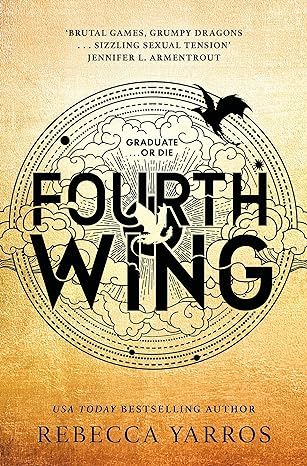
Fourth Wing (International Edition)
4.8
-
206,495
$7.95
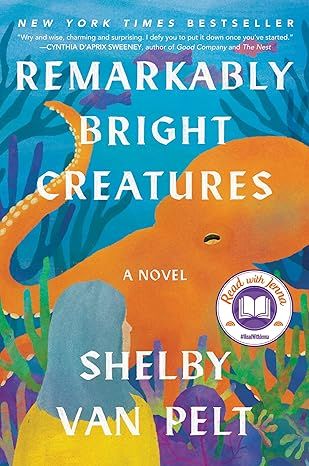
Remarkably Bright Creatures: A Read with Jenna Pick
4.6
-
65,556
$15.80
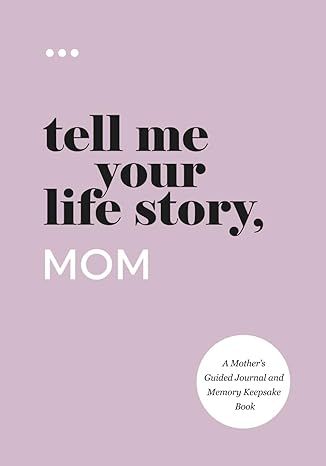
Tell Me Your Life Story, Mom: A Mother’s Guided Journal and Memory Keepsake Book (Tell Me Your Life Story® Series Books)
4.7
-
5,107
$11.24
